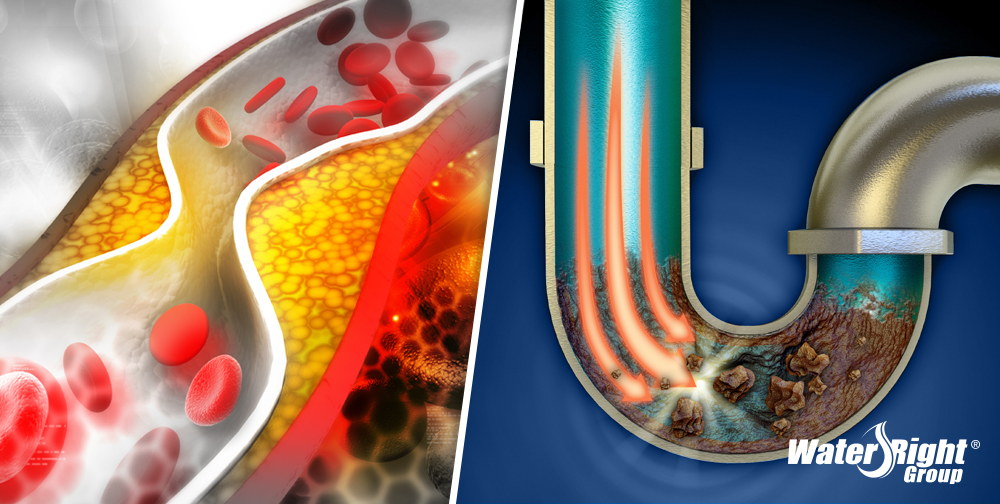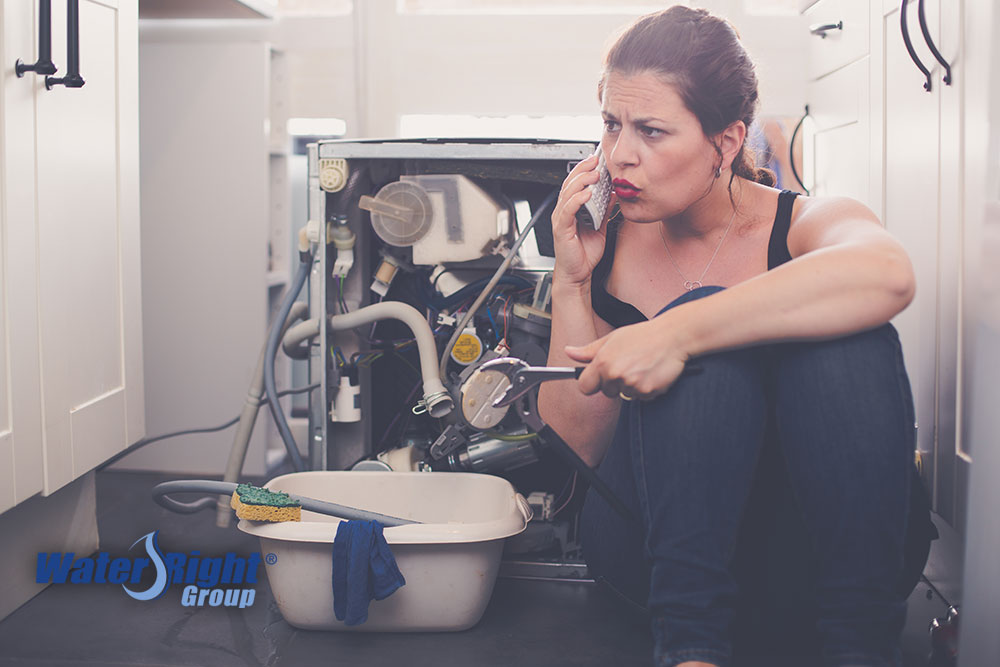
What Hard Water Plumbing Problems and High Cholesterol Have in Common
Your cardiovascular system is what moves blood through your body, delivering oxygen, nutrients, and more to its many cells. Those veins and arteries keep you alive. In your home, there are pipes that deliver water to different rooms of the house, helping you stay clean and hydrated.
In both your body and your home, blockages can cause big problems. While plumbing issues aren’t nearly as serious as having a heart attack, there are some striking similarities between pipes and heart health.
The Good, the Bad, and the Ugly
You’ve probably heard that not all cholesterol is bad. Low-density lipoprotein or LDL cholesterol is the bad stuff, and high-density lipoprotein (HDL) is good. According to WebMD, LDL cholesterol can combine with fats from the food you eat and build up on the walls of your arteries, which increases the risk of heart disease.
Minerals are what cause hardness in your home’s water, specifically calcium and magnesium. Normally, we think of those minerals as nutrients that promote good health. However, when there is too much calcium and magnesium in your water it can be a bad thing. The minerals found in most drinking water are dissolved rock, and they’re not easily absorbed by the body. It’s better to get minerals from healthy foods.
While minerals in water won’t hurt you, they can wreak havoc on your home’s plumbing. Calcium and magnesium leave deposits on the walls of your pipes, just as LDL cholesterol causes plaque to build up in your cardiovascular system.
Interestingly, the plaque that builds up in arteries can also contain calcium deposits, causing calcification, just like pipes exposed to hard water over an extended time. Both problems will constrict flow as arteries or pipes narrow due to the buildup.
That’s when things get ugly.
Do You Have Unhealthy Plumbing?

Your genetics can make you predisposed to health issues like high cholesterol and heart problems. Certain types of pipes in your home may also be more susceptible to problems from hard water mineral deposits. Plumbing systems with steel pipes are most likely to experience buildup. However, copper and PVC pipes can get clogged with lime scale deposits, too.
Hard water problems certainly won’t kill you, but they can make life miserable. From dingy laundry to spotty dishes and soap scum in the bathtub, hard water makes it difficult to keep your home clean. Hardness in household water can also cause dry, itchy skin and a problem described as “hard water hair.”
However, it’s what you can’t see that could be causing some of the most annoying and costly issues. Look for these clues indicating a hard water problem in your pipes.
Constant clogging
If you’re regularly pouring drain cleaner down the sink or shower, it could be a sign of buildup in your pipes. After a while, you’ll give in and call a plumber. This can be expensive, especially if the situation has gotten so bad you need to replace pipes or upgrade the entire plumbing system.
Poor water pressure
A common sign of mineral deposits clogging pipes is low water pressure in your home. When faucets don’t deliver a strong stream and your shower experience suffers, hard water could be the culprit. Watch for white, chalky lime scale on showerheads and faucets. If hard minerals are clogging up fixtures, they’re probably restricting water flow in pipes, too.
Appliances don’t last
One of the most expensive complications of hard water is the way certain appliances don’t last as long as they should. The hard water flowing through your pipes can reduce the length of time your washing machine, coffee pot, and dishwasher work properly. The appliance hard water impacts the most is often your water heater. The Water Quality Association (WQA) conducted research indicating unsoftened well water cut the lifespan of both electric and gas hot water heaters in half.
Not only does this mean buying a new water heater sooner, it reduces the efficiency of the appliance, which has a direct impact on your energy bills.
How to Find Out if Hard Water is the Problem
While there are no specific symptoms of high cholesterol, hard water is different in this case. There are certainly signs and symptoms that mineral deposits are contributing to headaches around the house. Yet, it’s also smart to get your water tested for hardness as well as other things that might be causing problems.
The Water-Right family, which includes the Evolve and WaterCare brands, employs knowledgeable experts who will visit your home and conduct a free analysis. They’ll explain what’s in your water, including the level of hardness. It’s like getting an expert diagnosis for your home’s water. Learn more about how a free water analysis works here on our blog.
Prevent Hard Water Plumbing Problems from Happening
If you have a family history of cardiovascular problems or physical signs that heart health could become an issue, your doctor will likely recommend things you can do to prevent bad cholesterol buildup.
Prevention is key in water treatment, too. Whether you have older pipes or a brand-new home, choosing high quality water treatment equipment will help keep water flowing. It starts with a new water softener.
When you’re enjoying soft water, not only will you reduce the risk of plumbing problems, you’ll also discover many other benefits. From sudsier showers and efficient appliances, to sparkling dishes and less soap scum, a water softener can make life cleaner and easier.
All Water-Right dealers are equipped to help you with your problem water needs.
Click the links above to visit the websites of our trusted brands. You can use the ‘Find a Dealer’ tool to locate a professional near you. For those who have serious concerns about water quality or potential contamination, you can use our Clean Water Testing service to get the answers you need.

